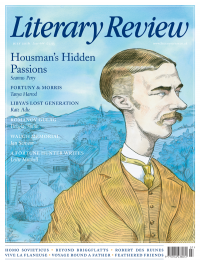Tim Blanning
Composing His Thoughts
The Ring of Truth: The Wisdom of Wagner’s ‘Ring of the Nibelung’
By Roger Scruton
Allen Lane 401pp £25
Richard Wagner’s The Ring of the Nibelung is a work that invites superlatives. More than a quarter of a century elapsed between its conception in 1848 and its first complete performance in 1876. The four parts (The Rhinegold, The Valkyrie, Siegfried, Twilight of the Gods) take between fifteen and seventeen hours to perform, depending on the conductor. It requires a dozen main soloists and a huge orchestra. Yet, despite the demands it makes on even the best-funded opera houses, not to mention audiences, its appeal has never waned. Indeed, today it is probably performed more often and in more places around the world than ever before.
Durability and universality are not the worst aesthetic criteria. Many other operas, of course, pass the same test with flying colours – The Merry Widow, for example – but very few deal with the fundamental issues of life and death. As Stephen Hawking observed in a BBC interview some twenty years ago, Wagner’s music goes deeper than anyone else’s. In this demanding but highly original and penetrating new study of The Ring, Roger Scruton explains how. He is wonderfully well equipped to do so: he has spent a lifetime immersed in the work and knows it back to front and upside down; he appears to have mastered the colossal amount of previous scholarship on the subject; he writes about the music authoritatively but comprehensibly; and, for the most part, he writes lucidly, cogently and even entertainingly (although we could do without words such as ‘stichomythic’).
Perhaps most important of all, he brings a philosopher’s toolkit to the task of reaching the heart of what he sees as an essentially philosophical work. At the outset he announces, ‘This is a work of criticism and also of philosophy’, adding that he is going to use it ‘as

Sign Up to our newsletter
Receive free articles, highlights from the archive, news, details of prizes, and much more.@Lit_Review
Follow Literary Review on Twitter
Twitter Feed
Under its longest-serving editor, Graydon Carter, Vanity Fair was that rare thing – a New York society magazine that published serious journalism.
@PeterPeteryork looks at what Carter got right.
Peter York - Deluxe Editions
Peter York: Deluxe Editions - When the Going Was Good: An Editor’s Adventures During the Last Golden Age of Magazines by Graydon Carter
literaryreview.co.uk
Henry James returned to America in 1904 with three objectives: to see his brother William, to deliver a series of lectures on Balzac, and to gather material for a pair of books about modern America.
Peter Rose follows James out west.
Peter Rose - The Restless Analyst
Peter Rose: The Restless Analyst - Henry James Comes Home: Rediscovering America in the Gilded Age by Peter Brooks...
literaryreview.co.uk
Vladimir Putin served his apprenticeship in the KGB toward the end of the Cold War, a period during which Western societies were infiltrated by so-called 'illegals'.
Piers Brendon examines how the culture of Soviet spycraft shaped his thinking.
Piers Brendon - Tinker, Tailor, Sleeper, Troll
Piers Brendon: Tinker, Tailor, Sleeper, Troll - The Illegals: Russia’s Most Audacious Spies and the Plot to Infiltrate the West by Shaun Walker
literaryreview.co.uk